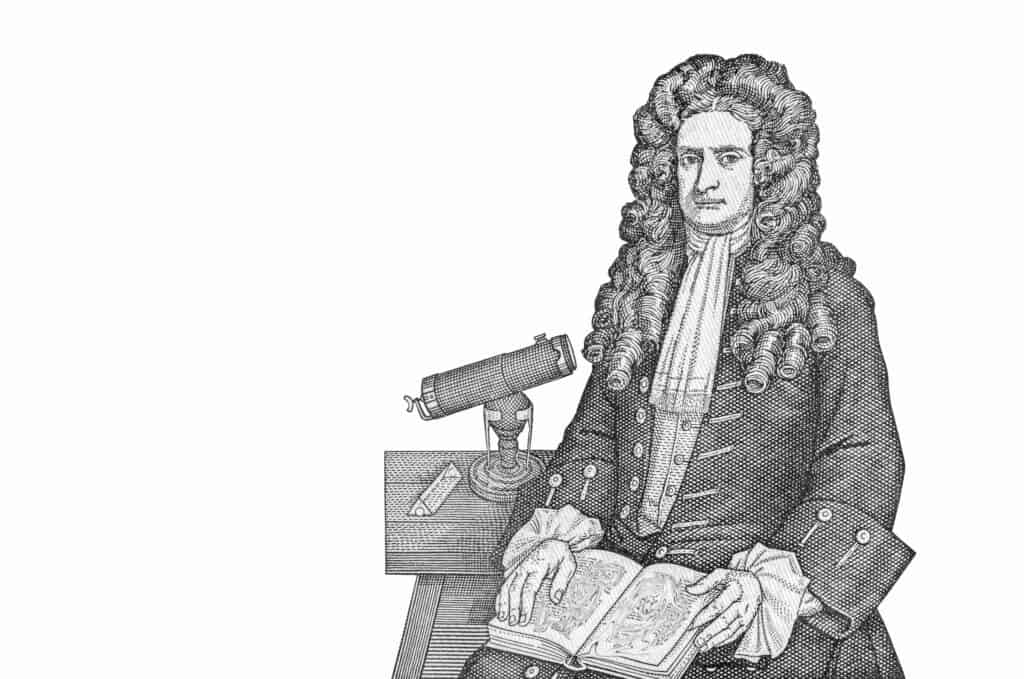One of the key figures in the Scientific Revolution of the 1600s, Sir Isaac Newton is considered one of the most important physicists in history. Where did Newton grow up?
Sir Isaac Newton was born and grew up in Woolsthorpe in Lincolnshire, England, the son of a farmer also called Isaac Newton. He was born on December 25, 1642, on the traditional Julian calendar but his birthdate is now considered January 4, 1643.

For more on the early life of Isaac Newton, read on.
Family
Isaac Newton was born in Woolsthorpe, Lincolnshire, England on what we now consider January 4, 1643. However, his birthdate is often written as December 25, 1642, as Britain used the “old” Julian calendar at the time of his birth.
His parents were a prosperous farmer, also called Isaac Newton and Hannah Ayscough Newton. The senior Isaac Newton died three months before his son was born.
The young Isaac was born prematurely and faced significant health challenges as a result. He was smaller and weaker than average and it was suspected that he would die in his infancy.
Newton survived, however, and his mother remarried when he was three. Hannah went to live with her new husband, Barnabas Smith, a wealthy minister and left Isaac to be raised by his maternal grandmother.
His mother’s departure had a significant impact on Newton as he grew older. He was known to be insecure and obsessed over any criticism of his published works.
When Newton was 12, Barnabas Smith died and Hannah returned to Newton’s life. She had given birth to three children while married to Smith, meaning Newton now had three half-siblings.
Education
Newton had been educated at the King’s School in Grantham, not far from his birthplace. During his time at the school, he lived with a local apothecary, an early type of doctor who created medicines.
The apothecary was the first person to introduce Newton to chemistry and the boy quickly discovered a passion for the subject.
After Hannah returned to Newton’s life, however, she quickly took him out of school, with the intention of him becoming a farmer. Newton had no interest in farming, finding it tedious, and was eventually sent back to King’s School to complete his education.
Newton’s uncle, William Newton, had been educated at Trinity College, University of Cambridge, and noticed his nephew’s great potential. He suggested that Newton be sent to Cambridge, with Newton becoming a waiter and cleaning the rooms of wealthy students between his studies.
Science
The Scientific Revolution was already in full swing by the time Newton began his studies at the university. The very nature of the universe was a hotly debated matter in scientific circles.
One of the major issues was the geography of the universe. Traditionally, scientists thought in geocentric terms, essentially that the Earth is the center of the universe and everything else surrounds it.
Other scientists such as Copernicus, Kepler, and Galileo, had taken a heliocentric view, that the sun was the center of the universe. While this isn’t strictly true either, it was closer to the truth than the traditional theories.
Despite philosophers such as René Descartes seeking to make some sense of the true vastness of the universe and how it functioned, Cambridge conformed to the traditional, geocentric view.
Newton, however, was keen to seek deeper answers. In addition to learning the standard university curriculum, he spent any free time reading modern philosophy.
Due to spreading himself so thin, Newton’s academic performance was below the expected level. He graduated without any academic distinctions or honors but his pursuit of deeper understanding saw him appointed as a scholar, with four years of financial support from the university.
After two years away from Cambridge due to the bubonic plague reaching the university, Newton became a minor fellow at Trinity College, his uncle’s alma mater. In 1669, he received a Master of Arts degree and wrote “De Analysi”, a treatise discussing his scientific findings.
“De Analysi” found its way into influential scientific and mathematic circles and Newton was quickly established as a brilliant young mind, while still in his 20s.
He wrote “Principia”, a landmark book on physics that detailed almost every major concept in physics, other than energy. The book explained motion and gravity in scientific terms for the first time.
While less dramatic than the famous story, Newton began exploring gravity after seeing an apple fall from a tree to the ground, rather than landing on his head.